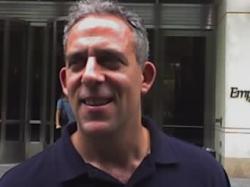Eddie’s mother is Korean, and his father is an African-American from Alabama. I’m an Italian-American from New York. Eddie is the teacher and I’m the student–not just in martial arts, but also about life.
I’ve been taking mixed martial arts lessons with my friend Eddie. Eddie is a superb athlete and an amazing teacher. Eddie trained in Korea for ten years and he has also won numerous Tae Kwon Do competitions in the United States. He’s the real deal. Two years of sessions tell me so.
And as I progress through the drills and sparring, we talk. We talk a lot. Eddie pushes to keep the session moving forward while I blather.
At fifty-three, martial arts challenges me to my very core, which is what I love about it. Even the stretching and warm-ups are very humbling for me. But Eddie has a knack for coaxing me, bringing out the best version of me, as he often says. I’m usually exhausted and drenched after every thirty-minute drill, bent over, and winded.
Our conversation is very open and honest. We talk about things like race, justice, and music; and about slavery, Black Lives Matter, and hip-hop. Having studied music at the University of Texas, as well as playing the horn in bands for many years, Eddie has a vast knowledge about jazz, hip-hop, and other genres. During our sessions, we listen to Eddie’s playlist of Miles, Hancock, and hip-hop instrumentals.

Courtesy: Pinterest
Eddie’s mother is Korean, and his father is African-American from Alabama. Eddie spent many years in Korea, standing out as an American in a foreign land and, even more so, as an African-American.
Then, in Texas, he spent years as a Korean-Black kid who didn’t grow up in America watching Gilligan’s Island and listening to eighties pop. Eddie has experience with being an outsider and with being different.
Of course, I talk with him about how Italian-American are outsiders, too. But like Dr. King said, “Injustice anywhere is a threat to injustice everywhere.” Until we can make the case that we’ve wiped out racism of all kinds and everywhere, it’s every person’s responsibility to address all prejudices.
Let’s face it, Italian-American kids aren’t being shot in the street. Italian-Americans aren’t being arrested for being in the wrong place at the wrong time–at least not anymore. The history of African-American racism is intolerably worse than the history of Italian-American racism.
Whatever the horrible experiences of Italian-Americans were during the peak of immigration to the United States, Italians weren’t legally considered ‘two-thirds of a person.’ And despite injustice heaped on Sicilians migrating to Louisiana during the turn of the 20th century, Sicilians weren’t considered ‘property’ by the American legal system.
When Eddie and I do our sessions in the park, I think about how the police would look at a 6′ 1″ black guy sparring with a 5′ 8,” gray-haired, white guy. Let’s face it: it wouldn’t be the first time law enforcement wrongly accused an innocent person of color.
Despite being younger, taller, and an incredibly talented martial artist, Eddie knows how to manage the give and take of student-teacher. He’s a master at it. He knows how to push, and he also knows how to give me room to feel like I’m not as bad as I am.
When we’re sparring, Eddie will allow me to get an open spot to tag him with a blow. They’re not hard blows, mind you, and we’re not pummeling each other either. Our sessions are more focused on technique–finding the open spot, managing cardio over a three-minute drill, and accuracy. The Korean term for this is Yak-so-kerogee, or trust fight. It is a promise to take care of each other.
Eddie throws a roundhouse kick. I throw a switch-kick with the opposite foot. We do those things over and over again. The idea is to develop speed and rhythm.
“Did you see the film The Green Book?” Eddie asks.
I shake my head affirmatively, then leap at Eddie, trying to sneak in a kick. He easily catches my left foot and shoves it to the right. “Yes,” I say, panting. “I was trying not to scream while watching it.”
The fact that Eddie cares at all about this conversation is endearing enough. It’s like he’s taken on my cause, too.
“In the end, he turns out to be alright,” I say, now running entirely out of breath and hoping the timer goes off so I can take a break. “But why does he have to be such an ignorant savage?”
Eddie hears me out. He listens. As someone who knows what it’s like to be different, to be judged, Eddie can understand. “He’s portrayed as an uncouth beast,” I add, and “He even eats like a slob.”
“It’s based on the book he wrote,” says Eddie. “Maybe Hollywood can find a new story–there are other stories to tell.” Eddie nods his head in agreement.
We’ve had versions of this conversation before.
Now, as our session winds down, we stretch. My hamstrings are tight, like old stiff wooden boards. I can’t touch my toes without straining.
“Hold this for a few seconds more,” Eddie says. I’m turning purple. “Ok, release now.”
I never stop talking.
Eddie is patient; he has a gift. He can lean down to your size and spar at your level. He can do this in conversation, too.
Eddie grabs my leg and pulls it way out to the left, trying to loosen the grip my hamstring has on it. My limbs are bolted to my body like I was built in a car factory.
Our session ends now. We stand-up, then bow. “Che-ree-yhut,” says Eddie in Korean. (Attention) “K’gyung ney,” I reply, in a gesture of mutual respect.
















